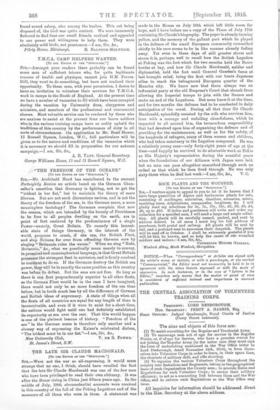"THE FREEDOM OF THE OCEANS."
[To TIM EDITOR OF TIa "SPECTATOR."] SIR,—Mr. Archibald Hurd has contributed to the current Fortnightly Review an article based on the German Chan- cellor's assertion that Germany is fighting, not to get the "trident in her fist," but to maintain the theory of mare liberum. But are not such discussions useless, and is not the theory of the freedom of the sea, in the German sense, a mere meaningless tautology 1' The Germans complain that now the oceans, which are intended by the bounty of Providence to be free to all peoples dwelling on the earth, are in point of fact enslaved by the predominance of a single Power—namely, Great Britain. To remedy this lament- able state of things Germany, in the interest of the world, proposes to crush, if she can, the British Fleet, and stop Britons for ever from offending German ears by singing " Britannia rules the waves." When we sing " Rule, Britannia," &o., what we practically mean merely to convey, in preeaical and unmetaphorical language, is that Great Britain possesses the strongest fleet in existence, and is firmly resolved to continue to do so. If the Germans destroy the British sea power, they will be in exactly the same position as this country was before, its defeat. But the seas are not free. So long as there is one fleet preponderantly superior to all other fleets, as the German Fleet would be in the case I have imagined, there would not only be no more freedom of the sea than before, but in truth much less by all the difference of German and British ideas of supremacy. A state of things when all the fleets of all countries are equal for any length of time is inconceivable, and even if it were to exist for a short time, the nations would fight until one had definitely established its superiority at sea over the rest. That this would happen is one of the plainest lessons of history. " Freedom of the sea" in the German sense is therefore only another and a clumsy way of expressing the Kaiser's celebrated dictum, "The trident must be in our fist."—I am, Sir, &o.,


































 Previous page
Previous page